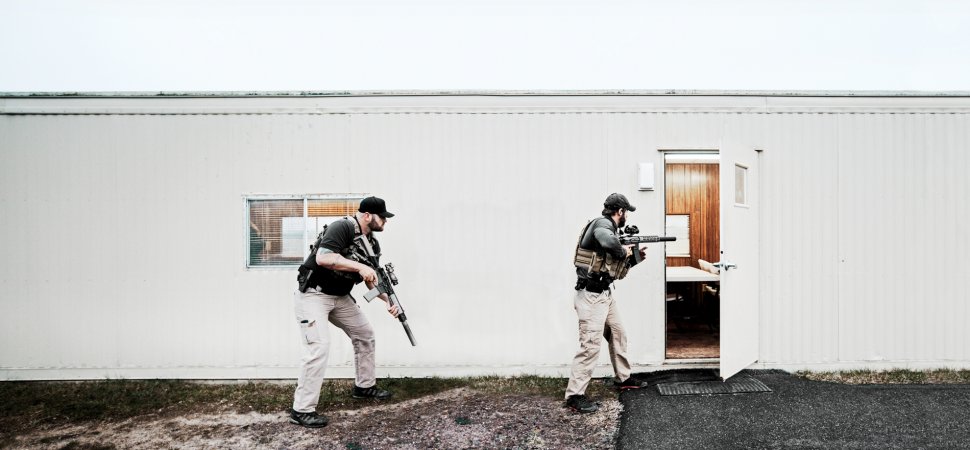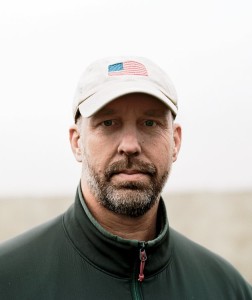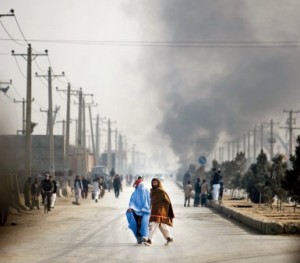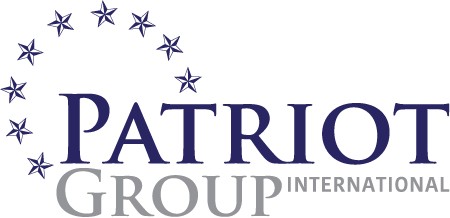What It’s Like to Run a Company in the Most Dangerous Places on Earth
Greg Craddock built a company on the controversial and crucially important business of military contracting.

Two Patriot Group employees—one a veteran of the Air Force and the other an ex-Marine—practice SWAT-like “room-clearing techniques” to be used in hostile environments, at a training facility in Midland, Virginia.
Greg Craddock was just sitting down to Christmas dinner at his mother-in-law’s when his phone rang. He glanced at the screen—one of his managers calling. Surely it could wait. Then, immediately, a second call. Then a text. “Very critical” is the only part he remembers.
Bad news can land at any moment—every CEO knows that. “Small business is the animal that never sleeps; it calls to you in the middle of the night,” Craddock says, and we all know what he means. But Craddock knows better than most. His company, Patriot Group International, a two-time Inc. 500 honoree with $33 million in annual revenue, is a government contractor. His customers include the Defense Department and various spy agencies. He has about 200 people on the payroll, most of whom go to work every day in places where they could very well get shot or blown up—Iraq, Afghanistan, Ghana, Djibouti, Somalia, and Libya, to name a few. They guard buildings, protect VIPs, train foreign soldiers, and do a lot of office work, too: “Our specialty,” says Patriot Group COO Rob Whitfield, “is providing sometimes common services in real crappy places.”
At 46, Craddock is a big man with clear eyes, a shaved head, a stubbly jaw, and a crushing grip, and he’s not naive. He’s a former Army Ranger and military security operative, after all, who spent years in conflict zones overseas. “Still,” he says, “nothing can prepare you for when you do in actuality receive that call.”
He excused himself from the dinner table. It was as he feared: One of his people—new to Patriot Group but not inexperienced; an Iraq war veteran, “not one to get caught with his guard down”—had been killed overseas, in what Craddock will describe only as “a coordinated enemy attack.” Five years in business, and this was Patriot Group’s first fatality. It probably won’t be its last.
“Our specialty is providing sometimes common services in real crappy places.”
Patriot Group’s headquarters occupy a second-floor suite in an ordinary office park in Warrenton, Virginia, about 50 stop-and-go miles west of Washington, D.C. The office decorations are less ordinary: a print depicting a nighttime helicopter landing in Afghanistan; a photo of the Stars and Stripes being raised at the U.S. embassy in Kabul; a poster filched from liberated Baghdad, with images of Saddam Hussein and two of his “derelict sons,” per Craddock; and a framed Iraqi flag, commemorating Craddock’s service with an elite government security force that protects U.S. intelligence officers abroad.
As a veteran, Craddock knows about war—what it is to confront bad guys face-to-face, to lose a friend in combat, to endure long separations from family, and then to wonder, once you’re out, whether you’ll ever again do anything as focused, as intense, as in-your-face important as what you did in uniform. As an entrepreneur, he also knows about business—what it is to risk everything on a proposal that goes nowhere, to be cut off by your banker, to drain your 401(k)—and ultimately what it feels like to succeed in a notoriously corrupt industry that’s closely regulated, intensely scrutinized, rife with unsavory characters (“Some of the folks who work for us—I wouldn’t want to be on their bad side, consistently”), and beholden like no other to the fickle winds of geopolitics.
Craddock is a professional reticent. He won’t identify publicly the security force he was assigned to abroad. Nor will he say anything about the attack that killed one of his employees—not how, not where, not why—other than, “It was the kind of thing that can happen to anyone at anytime in those types of areas.” (On that Christmas Day, in 2014, al-Shabaab militants killed three African Union peacekeepers and one foreign contractor in an attack near Mogadishu airport in Somalia; Craddock had no comment on that particular incident, either.)
Many details about Patriot Group’s business are shrouded in secrecy. Intelligence contracts, for instance, don’t appear on public databases, where much of what we can glean about Patriot Group’s work is blanketed in bureaucratic jargon. For instance, in June it won a Defense Department subcontract worth $1 million, in return for “AWG support”—helping the Army’s Asymmetric Warfare Group, an anti-insurgent unit.

After serving as an Army Ranger and a security operative, Greg Craddock went into business with two military buddies.
The Join Our Team page on Patriot Group’s website offers other clues. Are you a culinary professional with a top-secret security clearance who can handle “austere environments”? Or an explosive-ordnance-disposal specialist—a bomb defuser—able to travel on “very short notice” and willing to risk “limited exposure to chemical, biological, radiological, and nuclear hazards”? If so, Patriot Group is hiring.
And while he’s secretive about specific times and places, Craddock broadly describes building a business that, like all government contractors, must be opportunistic. Armed security is a core offering, as is weapons training and intelligence analysis, but Patriot Group’s résumé ranges from the glamorous to the bizarre. It has analyzed geopolitical threats for a global food company; guarded a Washington construction site for an intelligence agency; cast former soldiers and diplomats for training exercises carried out over several days in simulated urban war zones (“It’s like putting together an Oceans Eleven team,” says Whitfield); guarded a presidential candidate on the campaign trail (more on that later); and trained film crews before they embedded overseas. One such crew, making a documentary about military dogs called Glory Hounds, put Patriot Group’s training to the test when “we actually did get blown up,” says cameraman and former Marine Craig Constant, who rushed to apply a battlefield tourniquet to his colleague. “What they taught me was invaluable.”
Craddock’s company does this on its own and as a sub for, among others, mega-contractors Lockheed Martin and Northrop Grumman. Now that Patriot Group has outgrown certain small-business set-asides, it increasingly finds itself competing against those same big companies head-to-head.
On the one hand, then, Craddock’s a typical CEO, with ordinary CEO concerns—landing the big customer, managing growth, adapting to shifting markets, overseeing a high- performance work force, maximizing profit. On the other, he occupies an alternative universe, largely hidden from public view, one where CEOs sometimes outfit their employees with deadly weapons, send them off to war, and live with the knowledge that mistakes, bad luck, and circumstances beyond their control aren’t just costly but sometimes even fatal.
If you’re a bomb defuser able to travel on “very short notice,” Patriot Group may have a job for you.
“You hear ‘contractor’ and you think ‘mercenary,’ and Blackwater’s not far behind,” Craddock says. “There’s a profound stigma around what we do.” That’s a profound understatement.
The attacks on September 11, 2001, sparked a gold rush, and things got ugly. There was torture: Personnel from private contractors CACI International and Titan allegedly took part in one-third of the documented events at Abu Ghraib, according to an Army investigation. Murder: Four former employees of Blackwater are in prison for their role in the 2007 killings of 14 unarmed Iraqi civilians in Baghdad’s Nisour Square. And greed, outrageous greed: According to a 2011 report by the Commission on Wartime Contracting, “at least $31 billion, and possibly as much as $60 billion, has been lost to contract waste and fraud in America’s contingency operations in Iraq and Afghanistan.”
The rush is over now. Total Defense Department spending on contractors—including those supplying weapons and R&D as well as services—peaked at $412 billion annually, and is down more than 30 percent since 2009. Among the factors: troop drawdowns, shrinking budgets, and a deteriorating business climate marked by intense congressional scrutiny, stricter oversight in the field, and heightened public distrust. Contractors dug themselves a very deep hole over the past decade and a half; they’re still clawing their way out.
Yet the world remains a dangerous place. Where it was mainly al-Qaeda before, now it’s ISIS, too; where it was mostly Baghdad and Kabul, now it’s also Paris and San Bernardino. Terrorism of all kinds, rogue dictators, loose nukes, and cyberattacks are compounding the load borne by already strained conventional forces. That’s the reality Army general Martin Dempsey, former chairman of the Joint Chiefs of Staff, was speaking to in 2012 when he told an industry gathering that what contractors provide the military is “no longer a niche capability—it’s probably part of our core.”
Ironically, as spending drops, the relative importance of the private sector grows. Contractors deliver continuing access to talented people the military can’t otherwise retain and instant access to short-term skills. “You have to look at what capabilities you want to keep in-house, and which ones you want to pay big money for,” says Marine general James Lariviere, executive director of the International Stability Operations Association, a trade group on whose board Craddock serves.
One service the Defense Department decided to outsource in 2013: training counternarcotics agents in Kabul in the finer points of aerial druglord surveillance. Patriot Group won a piece of that contract—only to have one airbase training session interrupted when a Taliban fighter dressed in an Afghan army uniform sprayed the classroom trailer with bullets. (Three U.S. contractors working for a different company and one Afghan national were killed in the January 2015 attack.)
Threat levels rise and fall. Budget allocations ebb and flow. Public opinion swings back and forth. “But there are certain requirements that will not go away,” says Craddock. And that presents an opportunity. In 2010, Craddock and two of his military pals went after it. They bought a dormant company with a good name. They worked their contacts in the intelligence community, emptied their bank accounts, teetered for two long years on the brink of insolvency, and finally landed a game-changing deal. How does the stress and fear of running a business compare with actual warfare? “It’s a different type,” Craddock says, “but no less profound, and I would say it’s more lingering.” In business, the battle never ends.

Smoke rises in Kabul during January 2015 protests following the shootings at French magazine Charlie Hebdo. Earlier that month, Patriot Group employees survived a Taliban gunman’s attack at a local airbase. CREDIT: Newscom
Craddock wasn’t raised to serve in uniform. He grew up in tiny Gretna, Virginia; his dad was a teacher, and his mom worked at a radio station. He loved football, and played safety at nearby Ferrum College, but he was never a star. What he loved most was the camaraderie. After graduation, in the summer of 1992, he joined the Army—for “the flag, apple pie, serve the country,” absolutely, but also because “I wanted to be part of something again.”
After basic training at Fort Benning, Georgia, Craddock kept going, through infantry training, Airborne School, and what was then called the Ranger Indoctrination Program—a brutal sequence of ever-escalating challenges that about 60 percent of aspirants fail to complete. He “did all those things, very well,” says Al Buford, Craddock’s former Ranger platoon sergeant and now his business partner. He earned his Ranger tab in 1994, and served out his five-year enlistment at Fort Benning. His career goal at the time was federal law enforcement, but after he left the Army, he was turned down everywhere he applied. He bided his time, working as a school counselor and a management trainee for a home-remodeling company, until a friend got him an interview with that unnamed security unit. Three months after 9/11, Craddock was on a plane to Afghanistan, hurtling toward his first taste of active duty overseas.
The mission was rewarding, but the travel was lousy and the risks were extreme. He was married now, with two small children, and he was restless, increasingly impatient with the government system of professional development that favors seniority over capability. He came home, worked for a small military contractor, and finally struck out on his own. “I wanted to be leading,” Craddock says. “At some point, I got the feeling that I and some like-minded individuals could do a better job.”
One of those individuals was his buddy Whitfield, a former Marine “designated defensive marksman.” (He means sniper.) Whitfield grew up wanting to join the Army, but when he got to the recruiting office, the recruiter was on his lunch break, so he joined the Marines instead. “When do you want to leave?” the recruiter asked him. “Is tomorrow too soon?” he replied.
Another was Buford, who describes himself as “a rifle and body-armor guy, with a rucksack on my back and a long way to walk.” The three pooled roughly $200,000 from personal savings. (Craddock put in more than the others, and he has more equity.) Rather than start from scratch, they bought Patriot Group—a dormant company that had no contracts, but did have a clean reputation, little debt, a vendor network, and, critically, all the necessary certifications that would otherwise have taken months to acquire.
“We were miserable failures for a good 18 months,” says Buford, who became president, “but we just absolutely refused to quit.” Whitfield uses a military analogy: “You need to be prepared for your plan not to survive first contact with the enemy.” They were not. “Everything we wanted to do, we didn’t start doing any of it for three, four years. In the interim, we had to stay alive.”
When contractors die, they don’t return in flag-draped coffins. Their funerals highlight the tensions inherent in straddling two worlds.
The failures were spectacular and strange. One involved dogs. Patriot Group pursued early on what Craddock calls “a highly specialized canine contract,” one he perceived as “close to a lock,” and delivered at considerable upfront expense 10 bomb-sniffing dogs, with handlers, to be tested. All 10 failed. “I cannot tell you what a sick feeling that was in my stomach,” he says.
Another early bust: manning the security detail for 2012 presidential candidate Newt Gingrich and his wife, Callista. A Patriot Group employee allegedly got into a kerfuffle with a Ron Paul supporter named Edward Dillard at a Florida polling place. According to a lawsuit, the Patriot Group agent blocked Dillard’s path and, “when Dillard didn’t budge, that individual lifted his heeled shoe over Dillard’s right foot”—clad only in a sandal—”and dug the back of it into his skin, twisting it side to side like he was stomping out a cigarette, causing a fracture” to the foot. Patriot Group denied the allegation, and the case was later dismissed, but Craddock learned his lesson: No more campaign work. “We don’t like the attention,” he says, “and we like getting paid.”
Things got worse before they got better. Government lead times can be excruciatingly long, and soon Patriot Group’s bank abandoned it, forcing a mad scramble to find a replacement. Craddock spent down his retirement account; Buford dipped deep into his personal savings to cover payroll. A last-minute infusion from outside investors kept Patriot Group afloat, barely. Its big break finally came in 2012, when it inked a long-simmering deal for an intelligence client; revenue rocketed in one year from $800,000 to $11.2 million. It’s gone up every year since.
Nearly all of Patriot Group’s full-time employees and contract workers are veterans, many of them with at least 20 years of service and a background in Special Forces. That often means they have plenty of employment opportunities. For Craddock, making sure that workers are properly compensated and cared for is time-consuming and costly. Say the bank shuts off an employee’s credit card because he happens to be in Libya, and now he has no money. Or he’s driving 10 hours off the grid in Nigeria and his GPS fails. These might seem like minor inconveniences, but when your workers are overseas on life-or-death missions, “those are stressful situations for us,” says Whitfield.
Patriot Group can’t provide lifetime benefits comparable with the military’s, but it can pay a lot more. It’s not unusual for contractors to earn up to $5,000 a week—for tours that typically last six weeks to six months, followed by unpaid time off—plus top-shelf health and disability coverage. And it can offer what for many veterans is a kind of salvation. When they leave active duty, some have a hard time “trying to function like normal, everyday citizens,” says Craddock. “A lot of them are just very sad.” Working for Patriot Group is not only more thrilling than what they’re qualified to do on the outside; it comes with a powerful shared mission. No need for paintball outings to build a strong company culture.
Lucky soldiers go to funerals. Whitfield has attended 14 in the past three years, all but one for friends who died in combat or succumbed to wounds, physical or emotional, after coming home.
When contractors die overseas—as 3,259 did in Iraq and Afghanistan from 9/11 through 2015, according to the Labor Department—they don’t return in flag-draped coffins, to be mourned in public. Their funerals highlight the tensions inherent in straddling two worlds—business and military, private profit-seeking and public service. And they serve to remind those who work in this hidden, flawed, and crucial corner of the economy of the catastrophic cost of failure.
On the cold, bleak winter’s day that Patriot Group buried one of its own, Craddock’s thoughts turned to his colleague, the one who had called him and then the deceased employee’s mother; Craddock wasn’t sure he would have had the strength to make that second call. He mourned for the mother, and all the grieving family and friends, for whom Christmas would forever after be a reminder of loss.
And he remembered the victim. He was a grown man, Craddock told himself. He understood the risks and accepted the responsibility, and he was well trained, as prepared as he could have been for nearly any situation. But ultimately, he had died for Patriot Group, as a result of business decisions Craddock had made.
Lots of people have stressful jobs—Craddock knows this—and everybody suffers. He knows this, too: “There is a certain amount of tragedy every single person on the planet has in their life.” Still, here it was again, harshly illustrated: the critical difference between “what we do,” Craddock says, “and any other line of work. This is serious business.”
Government spending on personnel-based contracting is falling—but it’s still big business for these players.
For as long as American soldiers have gone to war, private contractors have gone with them. General George Washington hired them to drive supply wagons. During the Civil War, the Union Army relied on them for construction, labor, and transport. World War II created jobs for an astonishing 734,000 of them.
With the Gulf War, the Balkan wars, and the post-9/11 quagmires in Afghanistan and Iraq, contractors for the first time began outnumbering soldiers. They built bases, prepared meals, manned security details, and interrogated prisoners. A 2013 Congressional Research Service report counted 107,796 Defense Department contractors (including 33,107 U.S. nationals) in Afghanistan, compared with 65,700 U.S. troops.
Budget cuts and troop reductions have shrunk the market in recent years. According to DefenseNews, all but one of the top 10 defense contractors in the world reported falling revenue in 2014. That’s created a wave of mergers and acquisitions, led last year by Lockheed Martin’s $9 billion deal for helicopter maker Sikorsky.
But even as the pie shrinks, the portion of overall military spending captured by contractors has held steady, and in some cases grown. Among the biggest beneficiaries are contractors that specialize in providing services—i.e., boots on the ground. That field is led by privately held conglomerate Constellis, owner of Blackwater (now redubbed Academi) and Triple Canopy. But smaller players, including Patriot Group, are also getting a piece of the action. The Defense Department has been making “a concerted effort to increase share going to small-business vendors,” says Greg Sanders, deputy director for research in CSIS’s Defense-Industrial Initiatives Group, “and that effort has been paying off.”
FROM THE MARCH 2016 ISSUE OF INC. MAGAZINE
By David Whitford
Photo credits: Christaan Felber
